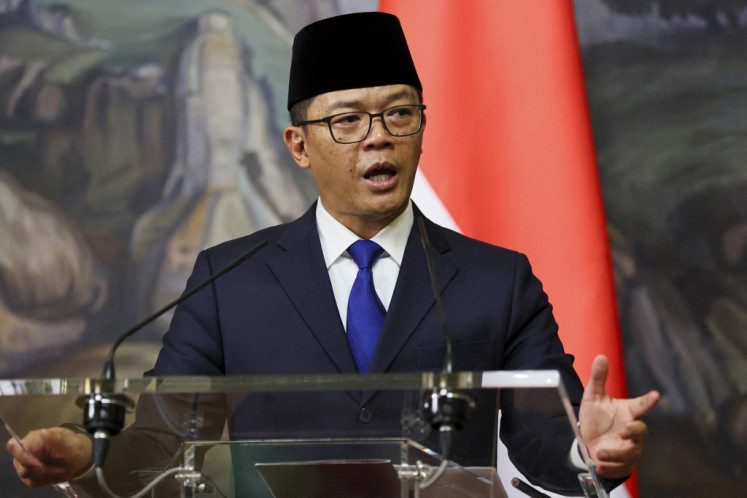Popular Reads
Top Results
Can't find what you're looking for?
View all search resultsPopular Reads
Top Results
Can't find what you're looking for?
View all search resultsForest fire, decentralization and governance
While rain has provided some relief to the haze problem in large parts of Sumatra and Kalimantan, thick smoke from the fire has been and is still affecting large areas of the islands
Change text size
Gift Premium Articles
to Anyone

W
hile rain has provided some relief to the haze problem in large parts of Sumatra and Kalimantan, thick smoke from the fire has been and is still affecting large areas of the islands. While the fire is contained within a large swath of the forest, the smoke has been polluting significant areas, including neighboring Singapore and Malaysia. The consequences are dire, several people have died and thousands more are showing signs of sickness, from skin irritation to respiratory problems.
A lot of people have, rightfully so, protested and questioned the response of President Joko 'Jokowi' Widodo's administration. Some of his political opponents have further questioned the legitimacy of the presidency, citing incompetence, lack of commitment and the inability to govern. This, to some extent, echoes what the ancient Confucian philosopher Mencius stated in the Mandate of Heaven, that disasters are signs that the mandate from heaven has been revoked and the people have the 'right of rebellion.'
Yet, while there were certainly local lords, the power structure in old China was centralized and arguably focused a lot on the kingdom and the emperor and or empress.
Within our political context, where governance is shared among various institutions of government and is, furthermore, heavily decentralized to local leaders, it is difficult to lay blame on any particular institution or individual, including the President.
As the law prescribes (Law no. 22/1999 on local government, amended by Law no. 32/2004), much of the exploration and exploitation of local resources (including forests) rests on provincial and local governments. The reasoning is simple; resources should go toward the economic welfare of people located in the place where these resources lie. Democratically, it is a way for people in the region to hold their leaders accountable and make sure that these resources are used in the best interest.
And yet, as the current smoke problems Sumatra and Kalimantan show, connecting resource use (or abuse) with accountability is not that simple. This fire problem has highlighted two main issues. First, it has shown the underlying concern toward the decentralization of governance in Indonesia is something that leads to a 'de facto' federalism running amok.
Second, it has shown the division and polarization in society as a result of the previous presidential election. Unfortunately, both these points illustrate a deep structural problem, not only in our disaster management system, but also our political system.
The current status of government decentralization, I refer to as 'de facto' federalism in Indonesia, creates what I would call a 'democratic asymmetry.' On the one hand, local or provincial leaders seem to be elected democratically, yet recent fire disasters have illustrated that these leaders appear to be relatively insulated from any consequences or repercussions related to their action (or inaction). For example, a governor's decree states that local authorities have the authority to grant 'clearing by fire' of up to 100 hectares. Yet, the public, both within and outside the affected areas have been seen to focus blame solely on the President.
The President has ordered a comprehensive review of the forest concession permits, but this measure has not gone far enough. From a practical standpoint, the central government, through the President, should develop punitive measures against local governments that have not worked hard enough to put out the fire and mitigate its effect.
While the central government, namely the President, does not have any authority to remove local officials from power (which is and should be reserved to the electoral process), the central government has the authority to withhold the disbursement of funds.
These measures should be undertaken in the following fiscal year and can range from temporary measures such as the withholding of discretionary funds and specially earmarked projects, to more permanent measures such as specifically changing the formula that becomes the basis for allocation of resources.
This might be seen as a reversal to the spirit of decentralization, but it would show that if the electorate has no channel for change or has not shown any willingness to punish their leaders' behavior democratically, then there is an entity to make sure that local governments do not get away with ignoring disasters, such as the current forest fires and subsequent smoke hazard. Finally, the central government, working with other organizations, needs to ensure that voters are aware of their local leaders and the decisions local administration have made.
Second, the hangover from the previous presidential election does not seem to wane, even after a year. The divisive nature of the election itself, along with smear campaigns, continues to this day. In more 'mature' democracies, criticism becomes a means of check and balance for governments.
In Indonesia's current divisive and polarized society, it is increasingly difficult to obtain constructive and critical criticism. Unsavory fly-by-night media continue to deliver coverage that has no meaning nor represents sound analysis. For this, however, there is no panacea. One only needs to let the democratic process straighten out the mess and let the electorates develop better critical thinking.
This does not absolve the Jokowi administration from any mishap in its administration of this disaster. As the rainy season approaches, one could easily dismiss the haze problem as an issue of the past. Yet, fires have been a recurring phenomenon throughout the past decade and thus it is important to make the issue a priority, to anticipate such disasters before the problem becomes too big to handle.
This could be achieved by developing stronger local governing capacity, as well as adequate policy tools to respond to future forest fires. In addition, one needs to make sure that accountability is shared, in a shared governance model. One cannot be expected to share the burden of governance without needing to show the slightest change in accountability to those voted them into office.
_______________________________
The writer is the founder of KawanJokowi, a volunteer organization that supported Joko Widodo's presidential bid in 2014.









